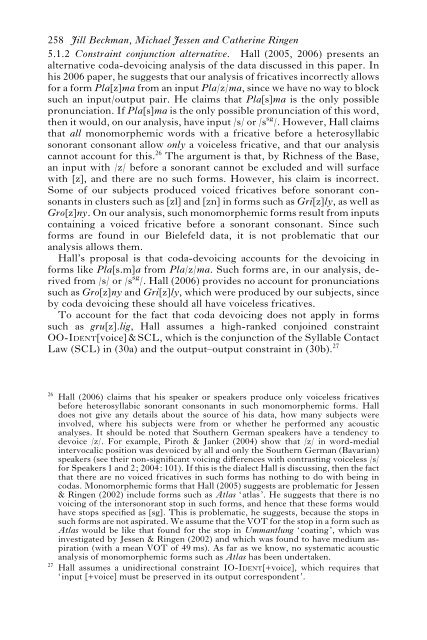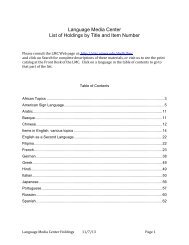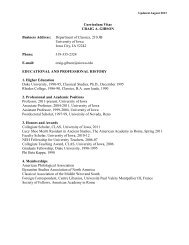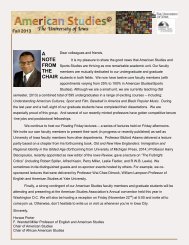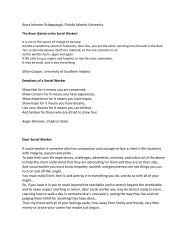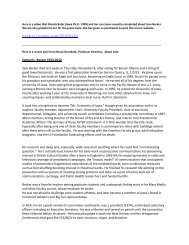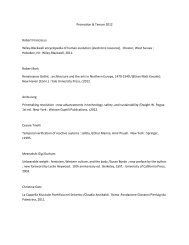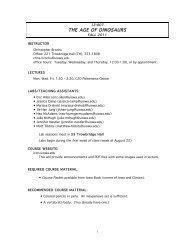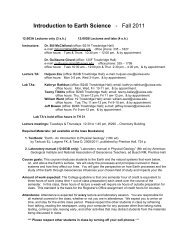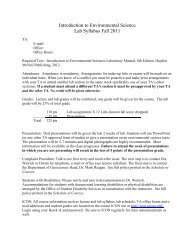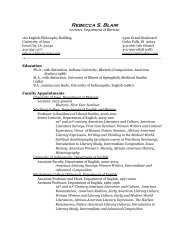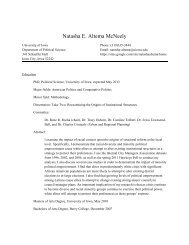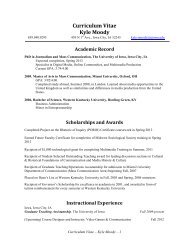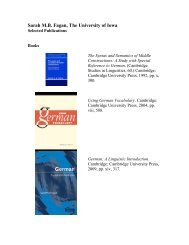German fricatives: coda devoicing or positional faithfulness?
German fricatives: coda devoicing or positional faithfulness?
German fricatives: coda devoicing or positional faithfulness?
You also want an ePaper? Increase the reach of your titles
YUMPU automatically turns print PDFs into web optimized ePapers that Google loves.
258 Jill Beckman, Michael Jessen and Catherine Ringen<br />
5.1.2 Constraint conjunction alternative. Hall (2005, 2006) presents an<br />
alternative <strong>coda</strong>-<strong>devoicing</strong> analysis of the data discussed in this paper. In<br />
his 2006 paper, he suggests that our analysis of <strong>fricatives</strong> inc<strong>or</strong>rectly allows<br />
f<strong>or</strong> a f<strong>or</strong>m Pla[z]ma from an input Pla/z/ma, since we have no way to block<br />
such an input/output pair. He claims that Pla[s]ma is the only possible<br />
pronunciation. If Pla[s]ma is the only possible pronunciation of this w<strong>or</strong>d,<br />
then it would, on our analysis, have input /s/ <strong>or</strong> /s sg /. However, Hall claims<br />
that all monom<strong>or</strong>phemic w<strong>or</strong>ds with a fricative bef<strong>or</strong>e a heterosyllabic<br />
son<strong>or</strong>ant consonant allow only a voiceless fricative, and that our analysis<br />
cannot account f<strong>or</strong> this.26 The argument is that, by Richness of the Base,<br />
an input with /z/ bef<strong>or</strong>e a son<strong>or</strong>ant cannot be excluded and will surface<br />
with [z], and there are no such f<strong>or</strong>ms. However, his claim is inc<strong>or</strong>rect.<br />
Some of our subjects produced voiced <strong>fricatives</strong> bef<strong>or</strong>e son<strong>or</strong>ant consonants<br />
in clusters such as [zl] and [zn] in f<strong>or</strong>ms such as Gri[z]ly, as well as<br />
Gro[z]ny. On our analysis, such monom<strong>or</strong>phemic f<strong>or</strong>ms result from inputs<br />
containing a voiced fricative bef<strong>or</strong>e a son<strong>or</strong>ant consonant. Since such<br />
f<strong>or</strong>ms are found in our Bielefeld data, it is not problematic that our<br />
analysis allows them.<br />
Hall’s proposal is that <strong>coda</strong>-<strong>devoicing</strong> accounts f<strong>or</strong> the <strong>devoicing</strong> in<br />
f<strong>or</strong>ms like Pla[s.m]a from Pla/z/ma. Such f<strong>or</strong>ms are, in our analysis, derived<br />
from /s/ <strong>or</strong> /s sg /. Hall (2006) provides no account f<strong>or</strong> pronunciations<br />
such as Gro[z]ny and Gri[z]ly, which were produced by our subjects, since<br />
by <strong>coda</strong> <strong>devoicing</strong> these should all have voiceless <strong>fricatives</strong>.<br />
To account f<strong>or</strong> the fact that <strong>coda</strong> <strong>devoicing</strong> does not apply in f<strong>or</strong>ms<br />
such as gru[z].lig, Hall assumes a high-ranked conjoined constraint<br />
OO-IDENT[voice]&SCL, which is the conjunction of the Syllable Contact<br />
Law (SCL) in (30a) and the output–output constraint in (30b).27<br />
26 Hall (2006) claims that his speaker <strong>or</strong> speakers produce only voiceless <strong>fricatives</strong><br />
bef<strong>or</strong>e heterosyllabic son<strong>or</strong>ant consonants in such monom<strong>or</strong>phemic f<strong>or</strong>ms. Hall<br />
does not give any details about the source of his data, how many subjects were<br />
involved, where his subjects were from <strong>or</strong> whether he perf<strong>or</strong>med any acoustic<br />
analyses. It should be noted that Southern <strong>German</strong> speakers have a tendency to<br />
devoice /z/. F<strong>or</strong> example, Piroth & Janker (2004) show that /z/ in w<strong>or</strong>d-medial<br />
intervocalic position was devoiced by all and only the Southern <strong>German</strong> (Bavarian)<br />
speakers (see their non-significant voicing differences with contrasting voiceless /s/<br />
f<strong>or</strong> Speakers 1 and 2; 2004: 101). If this is the dialect Hall is discussing, then the fact<br />
that there are no voiced <strong>fricatives</strong> in such f<strong>or</strong>ms has nothing to do with being in<br />
<strong>coda</strong>s. Monom<strong>or</strong>phemic f<strong>or</strong>ms that Hall (2005) suggests are problematic f<strong>or</strong> Jessen<br />
& Ringen (2002) include f<strong>or</strong>ms such as Atlas ‘atlas’. He suggests that there is no<br />
voicing of the interson<strong>or</strong>ant stop in such f<strong>or</strong>ms, and hence that these f<strong>or</strong>ms would<br />
have stops specified as [sg]. This is problematic, he suggests, because the stops in<br />
such f<strong>or</strong>ms are not aspirated. We assume that the VOT f<strong>or</strong> the stop in a f<strong>or</strong>m such as<br />
Atlas would be like that found f<strong>or</strong> the stop in Ummantlung ‘coating’, which was<br />
investigated by Jessen & Ringen (2002) and which was found to have medium aspiration<br />
(with a mean VOT of 49 ms). As far as we know, no systematic acoustic<br />
analysis of monom<strong>or</strong>phemic f<strong>or</strong>ms such as Atlas has been undertaken.<br />
27 Hall assumes a unidirectional constraint IO-IDENT[+voice], which requires that<br />
‘input [+voice] must be preserved in its output c<strong>or</strong>respondent’.


